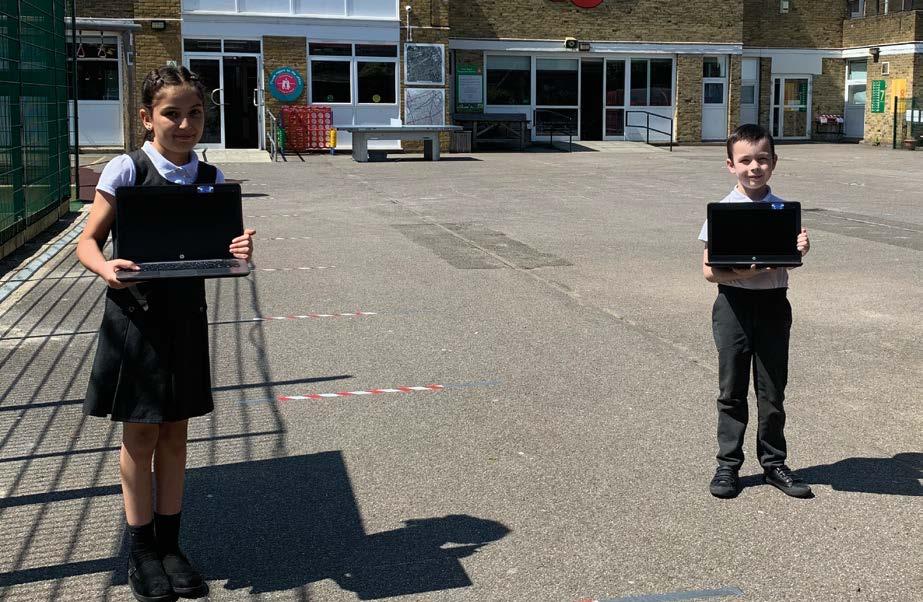
4 minute read
Technology
The digital DIVIDE
As the technological revolution gathers pace, it’s often taken for granted that people use a smart phone or have access to the internet. However, there’s a significant portion of the UK population that remains in digital poverty.
According to the latest government statistics, there are still 5.3 million adults in the UK, or 10% of the adult UK population, who don’t use the internet. Millions more rely on pay-as-you-go services to make phone calls or access education or healthcare services online.
The coronavirus pandemic has accentuated the digital divide between the “haves” and the “have-nots”. While those with internet access have been able to work from home and communicate with colleagues, friends and loved ones in the lockdown, those without have been left isolated. This has had a marked effect on the education of young people. Challenging the government on the devastating impact of lengthy school closures on poorer pupils, Robert Halfon, chairman of the education select committee, said that around 700,000 disadvantaged children were not doing homework and did not have proper access to computers or the internet – essential tools for online learning. In the current climate in which the coronavirus is forcing more people to work and study online, a significant number of people are struggling to learn the skills they need to either further their education, progress their career or get a job. This has major implications for someone’s employability, earnings potential and social mobility. Digital is fast becoming the third basic essential skill along with literacy and numeracy. Nowadays, virtually all jobs now require some level of digital capability, even in sectors such as engineering and manufacturing. It’s therefore essential that we all try to close this digital gap for the good of society and the economy. “Everyone has to adapt to the inevitable move towards digital and online learning: education providers, government, students, employers and workers. It’s essential that people don’t get left behind on this journey.

Digital poverty has been a long-term hidden issue for many residents in Wandsworth, on which the COVID-19 pandemic has shone a light. During lockdown, it became apparent that many local families were struggling to home school and stay digitally connected because they didn’t have access to a computer or broadband at home. To support these families, Battersea Power Station and Wandsworth Council joined forces to launch the Power to Connect campaign on 19th April. Since then, hundreds of emergency phone data top-up vouchers and wifi dongles funded by a £10,000 donation from the Battersea Power Station Foundation have been distributed to families in the borough. Battersea Power Station and Wandsworth Council have also set up a laptop and tablet refurbishment project, which collects devices that are in working order but no longer used, refurbishes them as Google Chromebooks with the help of volunteers and redistributes them to families across Wandsworth. Since launching Power to Connect, more than 340 devices have been collected, refurbished and donated to 41 local schools and 900 families have been supported. Power to Connect is now a Community Interest Company and the campaign will continue to collect devices from the local community and form partnerships with businesses that can pledge to donate devices when they update their laptops and desktops for employees. With 6,000 families in Wandsworth currently eligible for free school meals, schools preparing for local lockdowns and class bubbles having to potentially self-isolate, the need for Power to Connect to continue is clear. The campaign has also been shortlisted for a #Tech4Good Community Impact award, run by AbilityNet, and has launched a CrowdfunderUK campaign with the aim of raising £5,000 over the next month to continue combating the issue of digital poverty in Wandsworth.

For more information on Power to Connect and how to support the initiative, please visit www.powertoconnect.co.uk
Phishing, Spearphishing and Vishing
With many forced to work from home, cyber security is in sharp focus as hacking attacks have grown over lockdown. The UK Government’s National Centre for Cyber Security has published numerous alerts recently, including on 5th June highlighting remote workers being targeted by a Microsoft 365 phishing scam.
Phishing is a social engineering attack intended to acquire personal data such as login and password details or credit card/bank details. The attacker impersonates a trusted entity to trick potential victims into opening an email, IM or SMS and clicking a link. Unwittingly, the victim enters their account credentials on a fake website or malware is installed, leading to theft of data or money or a ransom being demanded. Spear-phishing is a personalised version, targeted at specific individuals or businesses, often electronic though increasingly by telephone (Vishing). The caller purports to be from a trusted entity such as your bank, internet service provider or the police. With company and personal information freely available online, convincing spear-phishing campaigns are easy to create. Protecting yourself is key - technology such as anti-malware, website filtering, spam filtering and data backup are essential, however don’t ignore the human element:
If you aren’t absolutely certain of the sender’s identity, don’t open an email/IM/SMS or attachment
Don’t click email links and enter your account credentials if you aren’t sure it’s genuine – fake websites can be very convincing
If you are unsure about a caller’s identity, ask for their details and say you will call back. Find the main telephone number from the company’s website and ask to be connected
Suspicious emails can be reported directly to the NCSC by forwarding to report@phishing.gov.uk. At June 2020 they had received more than 1,173,000 reports resulting in the removal of 4,590 scams and 11,543 fake URLs.










